


Game Six turned out to be the "Group of Death" for Season Three of AI Survivor. The use of a random draw for the opening round creates all sorts of fun and exciting matchups, but it also can create some unbalanced playing fields in terms of who gets drawn into which game. This takes place every four years at the World Cup, where in 2014 there was one horrendous group containing Spain, the Netherlands, Chile, and Australia... and then another group that ended up with Argentina, Nigeria, Bosnia, and Iran. One of those groups was just a wee bit tougher than the other. The same phenomenon was at work in this year's season of AI Survivor, and for Game Six we ended up with an unusually tough field of competitors. All seven of these leaders had made the playoffs in one of the first two seasons. Four of them had made the Championship game in one of the two past years: Elizabeth and Zara in Season One, Cyrus and Pericles in Season Two. As I wrote in the preview for this game, these seven leaders combined together for six gold medals and ten silver medals in the first two years of competition. We only ran 26 total games in those two seasons, which means that these leaders accounted for almost a quarter of the first place finishes and just under forty percent of the second place finishes. That was a lot of accumulated bling in their respective trophy cases.
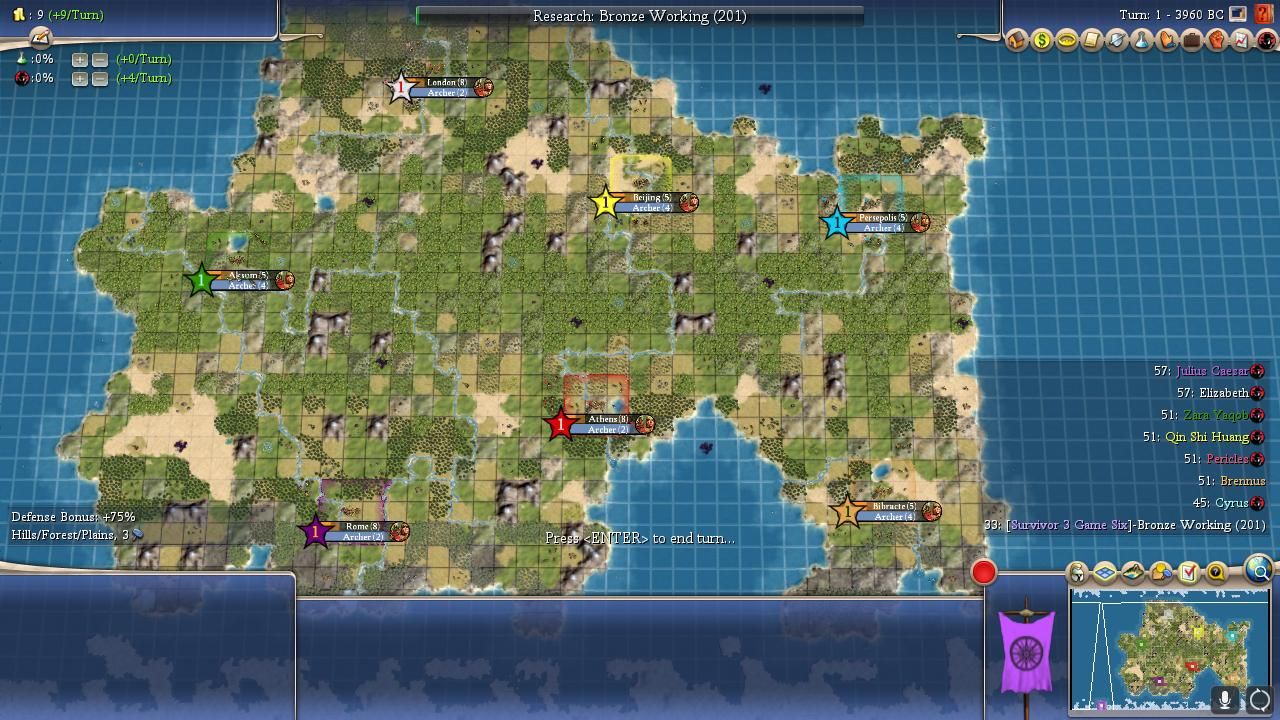
The map seemed to be set up to favor the leaders on the western side of the continent, where there was slightly more land available as compared to the more crowded east. I considered rejecting this map before ultimately deciding that it was good enough for our purposes. The pregame favorite was Zara Yacob, who had the most isolated start and a past history of success in this competition. One of the Livestream viewers remarked that this map looked similar to Zara's position in the Wildcard game for Season One, where he used a jungle-heavy start in a somewhat empty part of the map to romp to a runaway victory. The other popular choices for the winner, a bit behind Zara, were Cyrus and Elizabeth. Cyrus pulled off a remarkable run in Season Two of AI Survivor, and lost out in the Championship game by the narrowest of margins to a somewhat fluky Cultural victory from Huayna Capac while the Persian spaceship was in transit to Alpha Centauri. This was a chance for Cyrus to start the march back to the Championship once again. Elizabeth was popular due to an insanely strong starting location with triple food resources and a nearby gold hill to mine. As the only Financial leader in this game, she was the clear economic favorite. There was less interest in the other leaders to perform well, and the two central leaders (Pericles and Qin) were the popular picks in the First to Die category. Unfortunately for this field of strong leaders, the cruel math of AI Survivor meant that roughly half of them would be sent packing here in the opening round. Only two leaders could advance directly to the playoffs, and the best that the others could hope for would be a ticket to the Wildcard game.
The religious gameplay opened in the expected fashion, with Brennus immediately claiming an uncontested religion. He picked Taoism in a random dice roll and this faith would be the religion practiced on the eastern half of the continent in the early stages of the game. It was somewhat surprising when Elizabeth decided to open with Mysticism into Polytheism research and found Christianity a few turns later. She isn't particularly religious as far as AI preferences go, and there was no real reason for her to opt into an early religion. Perhaps it was due to the fact that she already had two Agriculture-based food resources at her capital to work with; most of the other AI leaders were opening the game with Animal Husbandry for their own cows and pigs and such. Lizzie ended up founding the Monotheism religion as well a little bit later, establishing Judaism in one of her recent cities. This created a situation where the religions were concentrated in some of the extreme corners of the map, leaving large areas untouched by any religion at all in the early game. Unlike some of the previous AI Survivor games, religion would play a lesser role in this world's diplomacy.
For once, all of the AI leaders sent their initial settlers in logical directions and established solid locations for their second city. No one wasted the extra starting settler claiming a backwater tundra iceball and screwed themselves out of contention immediately. As we watched these first few dozen turns play out, we did start to see some early winners and losers beginning to emerge. Elizabeth took the score lead at an early point in time due to the combination of her strong research and Holy City border culture. She was one of the first to four cities and appeared to be off to a good start. Caesar was also expanding rapidly, picking up four and then five cities in a circular pattern around his capital. The Roman borders looked a little bit like a turtle as one Livestream viewer pointed out. Cyrus was also using his Imperialistic trait to good effect, pumping out the settlers left and right to claim a key location on the border with China. This would restrict the amount of territory that Qin had available and left him stunted in the expansion race.
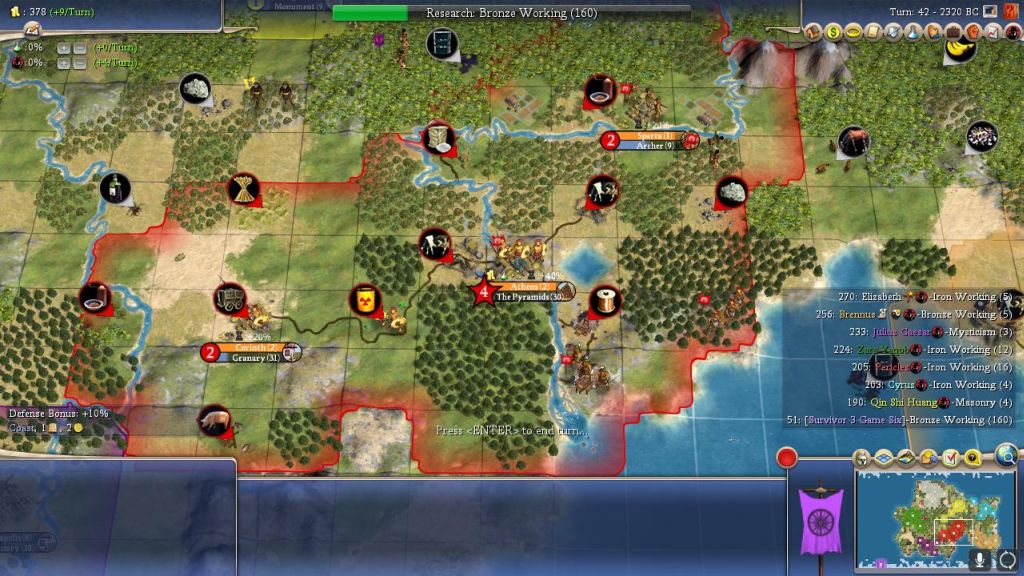
Another leader who was struggling was Pericles. He made the ill-fated decision to chase after the Pyramids before connecting his stone resource, tying up the precious early game production of his capital on a lengthy wonder build. To add insult to injury, he would eventually lose out on the Pyramids to Elizabeth who also had stone and won the race a few turns before the Greek leader. Pericles ended up with nothing but failgold, and he would find himself down near the bottom of the scoreboard in a vulnerable position. Qin also ended up getting shafted on land due to his own Stonehenge build, but at least he did land that wonder to start generating some culture for his cities. Zara was struggling as well, with only three cities at the time of the above picture. The Ethiopian leader had wasted time constructing the Great Wall and the large tracts of jungle were hampering his early expansion. The key difference was that the far west still had open territory left unclaimed, giving Zara time to get back into the game. It appeared that Pericles and Qin lacked the same opportunities.
Cyrus led the pack with six cities on Turn 50, with another settler on its way to establish city number seven. His score was unimpressive at the moment, but it would inevitably climb as those cities grew in population and territory. Zara and Qin were the runts of the litter with only three cities apiece. Meanwhile, Caesar would soon establish one of the most important cities of the whole game:
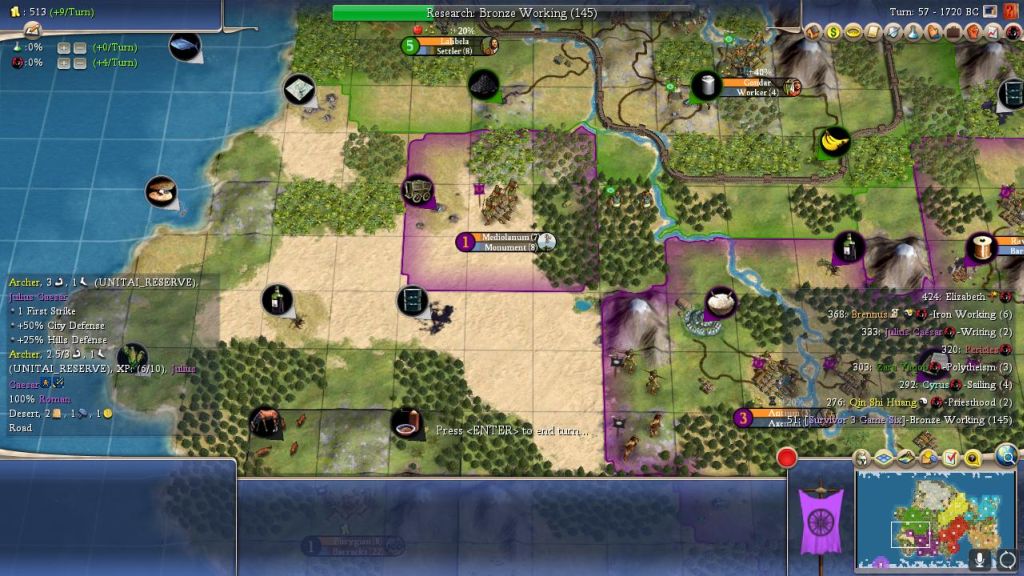
Mediolanum accomplished several key purposes. First and most importantly, it granted Rome access to an iron resource. Praetorians are one of the most game-breaking units in Civ4 and if Caesar was going to accomplish anything in this game, they would be crucial to his success. All of the other iron locations in the region had been claimed and this was the final one available. There was one more iron down in the deep southwest, however the barbarian city of Phrygian (at the bottom of the above image) had popped up and blocked anywhere from settling there. If Caesar missed this iron resource, he wouldn't have had access to his unique unit at all. Second, by claiming this spot Caesar was making a bid to cut off Zara from the rest of the southwest corner. If the Ethiopians had played a slightly stronger opening, then it might have been Zara claiming this location and threatening to do the same thing in reverse to Rome. As it turned out, Zara would settle a pair of cities on the western coast later and this area would be split between Ethiopia and Rome, with a heavy dose of border tension between the two. Caesar's control of this spot would prove to have major implications later.
Over the following turns, we watched in amusement as Elizabeth managed to promote a barbarian archer all the way to City Garrison III with a series of ineffective attacks. She's not a very good leader when it comes to warfare. Eventually, the English would claim the barbarian city on their borders after coming back with more advanced units. More religions also popped up on the map, all of them in the western part of the continent. Elizabeth built the Oracle and used it to slingshot Theology, founding Buddhism as a minority religion. That was her third religion of the game and it wouldn't wind up spreading very far. Caesar also decided to take part in the religious game, researching Code of Laws and founding Hinduism down at the southern edge of the map. He would be the only one to follow Hinduism in this game, creating tensions with Elizabeth and Brennus for their rival faiths. Still, it was at the other end of the world where the first conflict broke out, a border dispute that had nothing to do with religion at all:
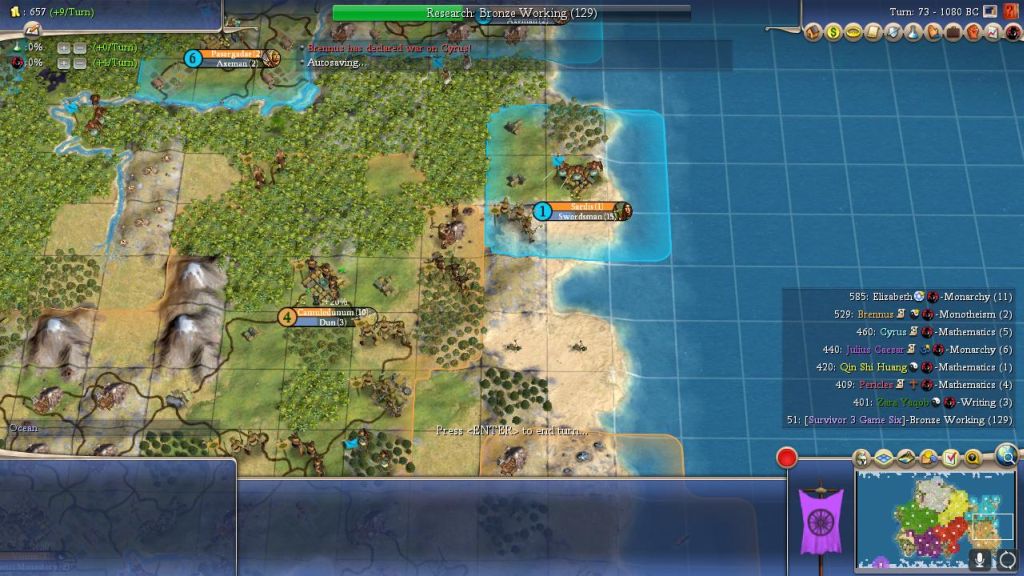
Brennus launched a sneak attack against Cyrus, and his force of Gallic Swordsmen were able to take Sardis easily. Despite his success, Brennus was the victim of slightly bad timing here; if he had waited a single more turn (or if he had moved after Cyrus in terms of turn order instead of before him), then Sardis would have been captured. Instead it was auto-razed and Brennus gained precisely nothing for his aggression. This was the start of a very lengthy and mutually destructive war between the two easternmost leaders. Brennus would repeatedly invade Cyrus only to have his attacking stacks shredded against the hill defenses of Pasargadae. Cyrus would then attempt a counterinvasion and suffer the same fate. They repeated this dance over and over again for dozens of turns on end, neither one able to make any progress against the other. Both AI leaders had about the same amount of territory and fought at the same technological level. That's a recipe for useless slaughter in Civ4, and it certainly proved true here. Note the position of Brennus and Cyrus on the scoreboard at the time that this war broke out, with Cyrus in second place and Brennus in third place. Both of them would slowly drop over time as they kept building units and then throwing them away in endless combat while the rest of the field invested in research and infrastructure. Brennus was killing Cyrus' chances of winning the game with this destructive war - but he was killing his own chances at the same time.
Elsewhere, Elizabeth picked up a Great Engineer from the Pyramids + Philosophical combination and used it to rush an incredibly early Apostolic Palace on Turn 84. She had decided to switch over to Judaism and that became the AP religion, leaving her on the same religious team as Qin but separated from Pericles and Cyrus, who had picked up English Christianity at an earlier date. Furthermore, Zara had somehow managed to acquire Taoism as his faith despite starting about as far away as possible on the map from Brennus, the Taoist founder. The religious situation in this game was starting to get very confusing.
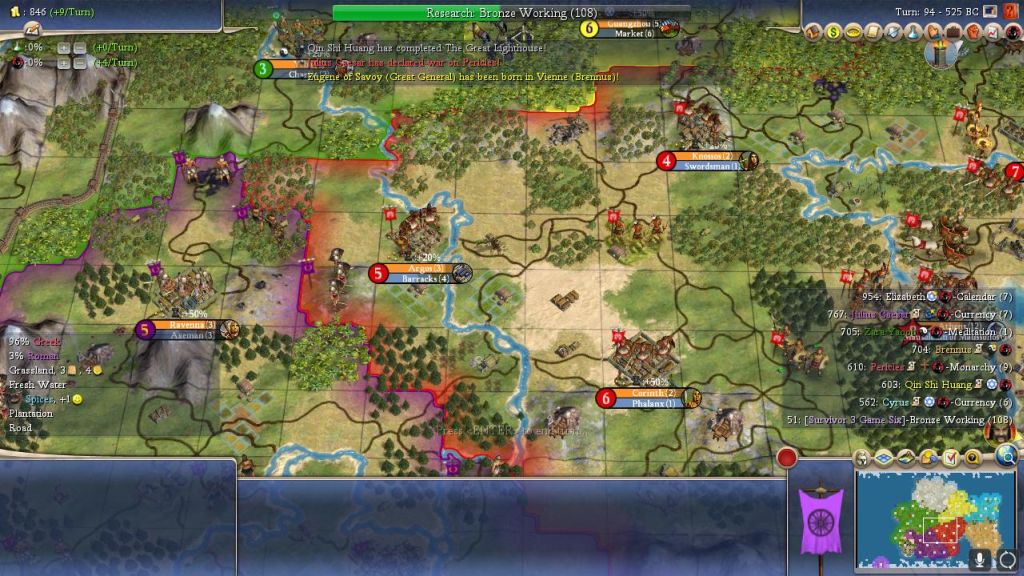
Caesar decided to launch his first attack shortly before Turn 100, invading his Greek neighbor at the border city of Argos. This was where the possession of that iron resource became so important, as it was the Roman Praetorians that did the heavy lifting here. They ran over the Greek defenders without breaking a sweat and captured Argos two turns later. The AI tends to defend its cities by fortifying units inside them, and although it does build mobile reserves of units, it doesn't understand the concept of fighting enemy units on terrain that nullifies their promotions. Caesar was promoting all his Praetorians to City Raider II, and Pericles was trying to defend by sitting in his cities where his units were shredded by those very same promotions. The higher base strength on Praetorians makes them incredibly effective in these situations, and even axes are fairly helpless once the City Raider promotions nullify the +50% against melee innate bonus. It becomes strength 8 against strength 5 and that's not a healthy position at all for the defender. We had a vivid demonstration of that situation in this game, as Caesar moved on next to the Greek city of Corinth after taking Argos. The city had walls and was packed full of half a dozen Greek Phalanxes (their unique unit axe replacement). I didn't think that Caesar would have any chance to capture the city unless he came back with catapults. Wrong! City Raider Praetorians crushed right through and took out half the Greek army. This was dire news indeed for Pericles and he was looking more and more likely to be the first leader eliminated.
Note as well that Elizabeth was a good distance clear of the rest of the field in terms of score as we hit Turn 100. She was the definite tech leader and was building most of the game's key wonders, although Qin did manage to score a crucial one when he landed the Mausoleum. Elizabeth decided to get into the warfare game herself on Turn 97, declaring war on Qin and easily capturing the Chinese border city of Xian. It looked like we might have a simultaneous meltdown of the two leaders in the center of the map, and if Elizabeth could run over all of the Chinese territory, she might become this game's unstoppable juggernaut. All that land plus Financial/Philosophical traits and a gazillion wonders would be nearly impossible to stop. Instead Elizabeth signed a peace treaty with Qin just eight turns later, with only the one city changing hands. If there was one lesson we learned repeatedly throughout this game, it was that Lizzie was too peaceful for her own good. This was a missed opportunity for England.
Freed from the spectre of war with Elizabeth, Qin turned around and jumped on his collapsing southern neighbor:

Roman armies were already marching across the plains of Greece, and Qin decided to join in the fun as well. This was perfectly timed from Qin and turned out to be one of the moves that helped stabilize his position. The Chinese forces would manage to capture both Knossus and Sparta, adding a pair of high quality cities and some desperately needed territory. Caesar would put Athens under siege (now that he had catapults) and eventually take it for himself on Turn 146. The race was now on to see who would claim the remaining spoils from the dying carcass of Pericles. Qin might have been able to vulture another city for himself except that Elizabeth decided to invade China once again on Turn 143, this time with English knights in tow. Surely this time she would be able to make more progress, right? In any case, that left the remaining Greek territories for Caesar to claim and he was happy to do exactly that, eliminating Pericles on Turn 155:
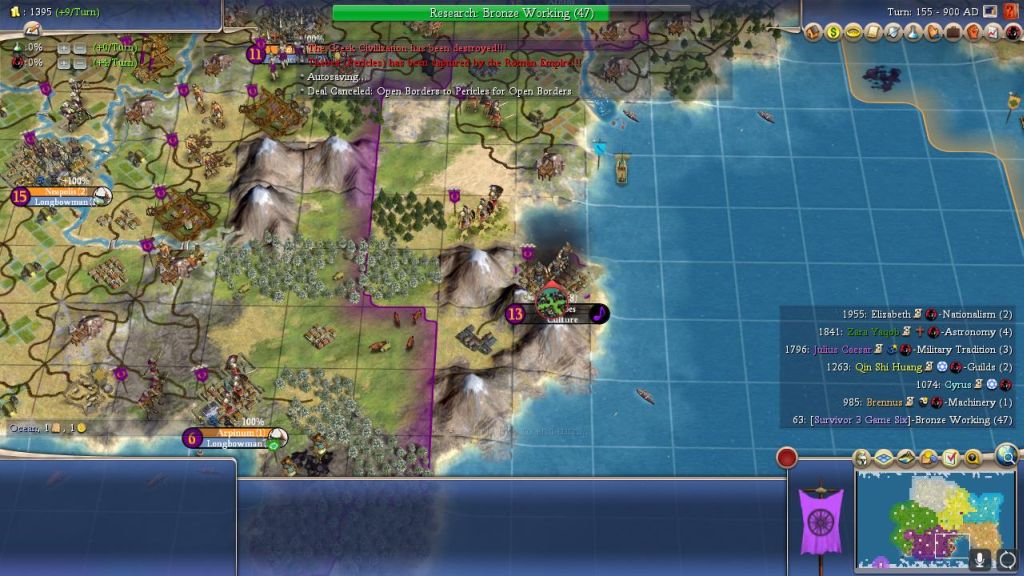
With Alexander's own early exit in Game Five, that meant a farewell to the Greek presence in Season Three of AI Survivor. This had been a tough map for Pericles; he's a pretty good AI leader overall, but he needs a position with other high peace weight AIs nearby to help shelter him from early attack. Left to his own devices, Pericles is a little too willing to build wonders and leave himself exposed for a more aggressive AI leader to slip in and attack. The decision to spend 25 turns building the Pyramids - without stone! - ended up crippling his expansion in this game, and he simply didn't have enough territory to work with. Caesar and Qin did a fine job of partitioning his territory, with the Romans getting the lion's share of the spoils. Now we wondered where Caesar would look to strike next, when he inevitably returned to war once again.
There were two major developments that took place over the following turns. The first was the rise of Zara Yacob, the pregame favorite who had been off to such a slow start. Zara had eventually managed to settle the western parts of the map, capturing two of the barbarian cities that spawned in the wilderness and claiming them for himself. He had slowly cut down most of the jungle and it was now a fertile region of grassland tiles. Note in the picture above that Zara was chasing hard on the heels of Elizabeth for the score lead, not to mention Caesar was also climbing fast with his recent conquests. This was turning into a very tight race for first place. All eyes were on Zara as far as where he would choose to attack, as the only leader who had not been involved in a war yet. Zara had managed to climb into the top military position, and he was clearly plotting a war of some kind. When he did choose to strike, it was against... Cyrus?! What the heck?  Zara did take two Persian cities, and combined with the attack from Brennus (yes that earlier conflict was STILL going on!) it seemed like Cyrus might be slated next for elimination. Still, this was a very puzzling decision. Why go after Persia on the other side of the world when there were other targets closer to home?
Zara did take two Persian cities, and combined with the attack from Brennus (yes that earlier conflict was STILL going on!) it seemed like Cyrus might be slated next for elimination. Still, this was a very puzzling decision. Why go after Persia on the other side of the world when there were other targets closer to home?
The other major development was the ongoing war between Elizabeth and Qin. With the English tech advantage, we expected that further Chinese cities would soon start falling to Elizabeth. After all, she had knights and Qin was still a good distance away from them. Instead, the border city of Xian was surprisingly recaptured by Qin. That was odd, but it had been almost completely surrounded by Chinese culture. Maybe Elizabeth just needed to attack somewhere else. Then a few turns later we saw another city taken:
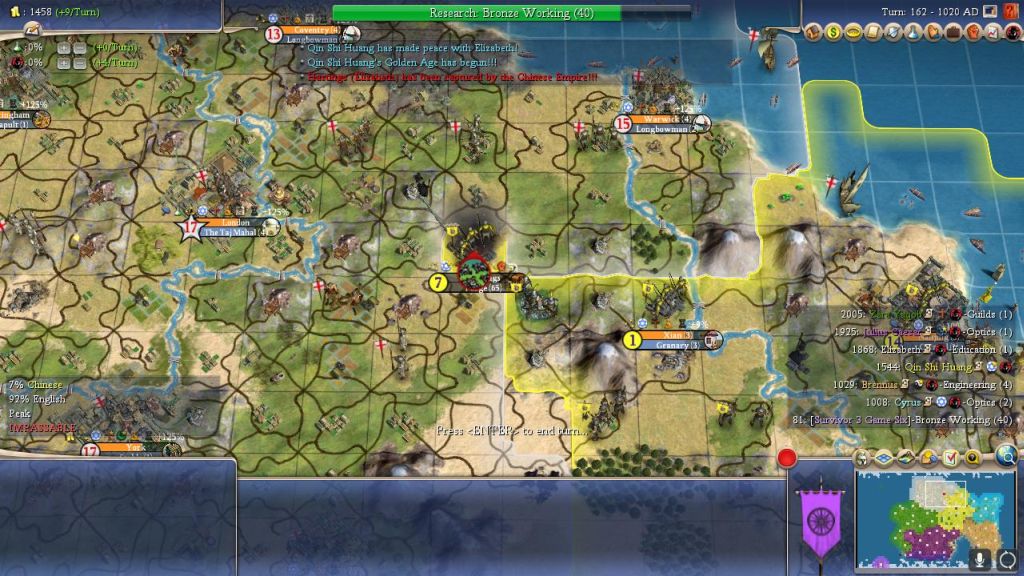
Another ENGLISH city taken! Lizzie, what in the world were you doing?!?  Somehow she lost a core city to her smaller and less technologically advanced neighbor. And it's not like this was a Chinese sneak attack that Elizabeth hadn't seen coming - she was the one who had started the war in the first place! We were watching the English cities during this war to see what they were building, and it was clear that Elizabeth AI wasn't training enough units. She was determined to keep producing wonders, city buildings, and religious missionaries even as the Chinese units were streaming across the border. Thus we ended up with the bizarre spectacle of Elizabeth building the Taj Mahal and discovering Liberalism first, while also having a city four tiles from her capital captured by the Chinese. She couldn't even take Hastings back because Qin managed to lock in a peace treaty right after pulling off the successful attack. Unbelievable. Now Zara was in first place in score and Lizzie had dropped all the way down to third place behind Caesar. Too peaceful for her own good.
Somehow she lost a core city to her smaller and less technologically advanced neighbor. And it's not like this was a Chinese sneak attack that Elizabeth hadn't seen coming - she was the one who had started the war in the first place! We were watching the English cities during this war to see what they were building, and it was clear that Elizabeth AI wasn't training enough units. She was determined to keep producing wonders, city buildings, and religious missionaries even as the Chinese units were streaming across the border. Thus we ended up with the bizarre spectacle of Elizabeth building the Taj Mahal and discovering Liberalism first, while also having a city four tiles from her capital captured by the Chinese. She couldn't even take Hastings back because Qin managed to lock in a peace treaty right after pulling off the successful attack. Unbelievable. Now Zara was in first place in score and Lizzie had dropped all the way down to third place behind Caesar. Too peaceful for her own good.
We thought that this might be an opportunity for Caesar to strike at Elizabeth and hasten her decline. Instead, he was hunting prey closer to home:
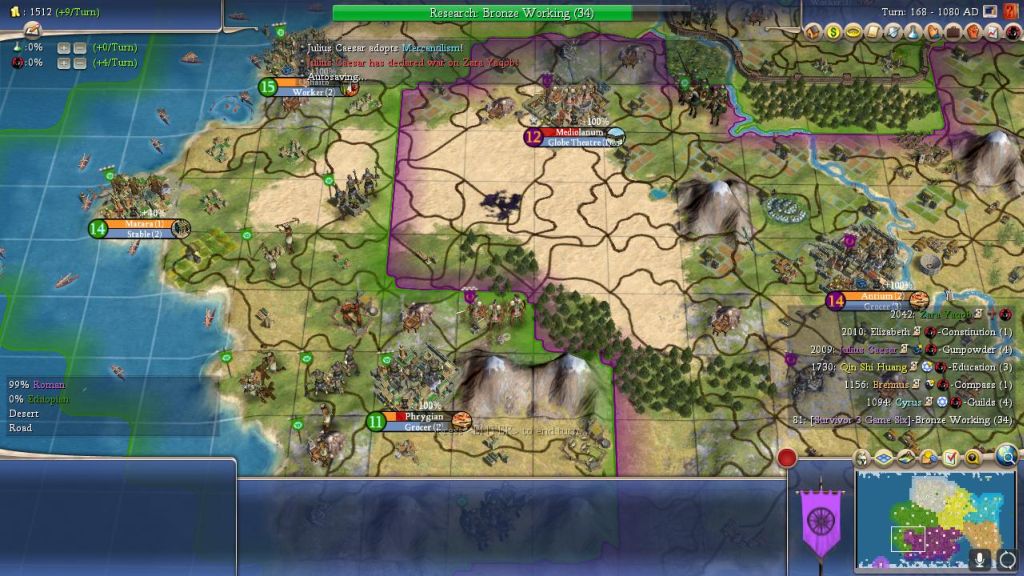
Zara was the target, and once against Caesar had chosen an excellent moment to strike. The core of the Ethiopian army was off fighting thousands of miles away in Persia, giving the Romans virtually uncontested control of the field here in the west. This attack was immediately successful, with Caesar capturing Phrygian followed by Qohaito to the northwest. That left the city of Matara isolated in a small pocket of Ethiopian culture, where it was virtually guaranteed to fall as well. Zara's conquest of two Persian cities turned out to be meaningless, as all of his units over there were left stranded and eventually died to renewed attacks from Cyrus. The Achaemenid leader would eventually reclaim both of them; we figured at this point that Cyrus was hunkering down and simply trying to survive long enough to reach the Wildcard game for another shot there. He did finally get peace with Brennus around this time and was able to start the rebuilding process. As for Zara, he had picked the wrong target for his aggression and was suffering for it enormously. Caesar picked up the aforementioned two cities and then claimed a third in a peace treaty signed on Turn 188. While this gave Zara a reprieve, he had been badly damaged by these two wars, with his score now dropping below Qin. It was going to be an uphill struggle to get back into contention from this position.
The following turns were an interlude of sorts between major conflicts. A farcical conflict began when Brennus declared war on Elizabeth on Turn 171, one of those seemingly crazy invasions caused by religious differences and a wide gap in peace weight. The Celtic army of maces and elephants shouldn't have had any success, and yet it almost managed to capture the English city of Canterbury, coming as close as a single redlined English catapult at one point before Elizabeth could reinforce the city. How did she keep struggling so much against these backwards AI empires? Lizzie did gain the upper hand pretty quickly, but she was unable to counterattack into Celtic territory because Qin wouldn't sign Open Borders with her and Chinese culture blocked all of the pathways to the east. This prompted a whole bunch of "Brexit" jokes on the Livestream about England and their border control issues, which I did find pretty amusing.  Then Caesar decided to declare war on Brennus as well, leading to this screenshot:
Then Caesar decided to declare war on Brennus as well, leading to this screenshot:
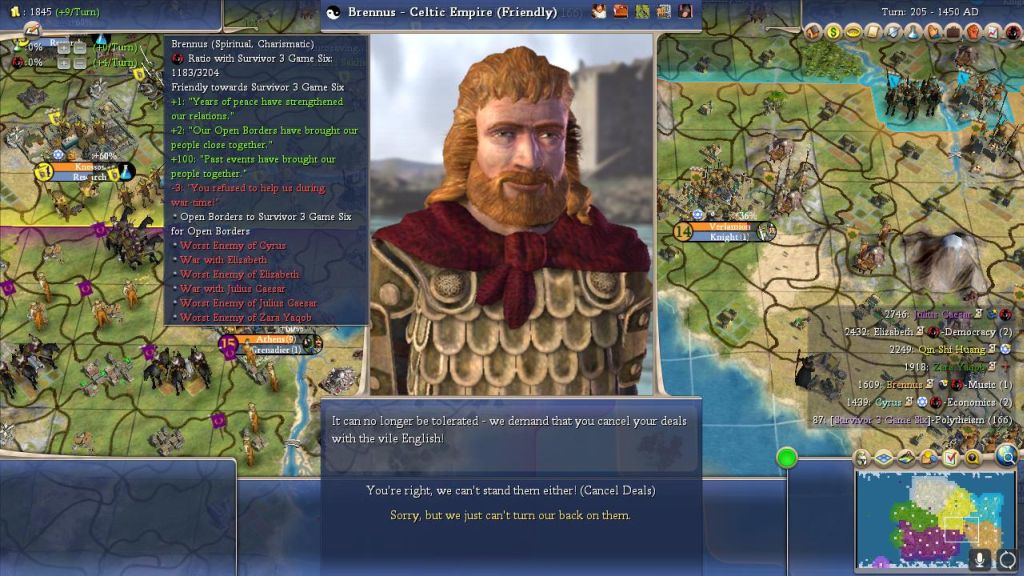
This one might as well be called "the dangers of following your own religion and having a peace weight score of zero." Brennus was now the worst enemy of every leader in the game save Qin, and with the Roman legions in the field against him, it looked as though he would be the next one slated for elimination. Ironically it was Elizabeth who came to his aid, using the Apostolic Palace to force an end to the war a dozen turns later. Brennus had lost the border city of Verlamion visible in the image above, and Caesar had a whole slew of cavalry riding through his core about to start taking more prizes left and right. Given another dozen turns, half of Celtica would have been conquered. Instead Brennus was able to escape a certain doom by the narrowest of margins, and he continued to lurk in the southeast corner of the map.
In big picture terms, Caesar had now emerged as the territorial and score leader. He had Rifling and Military Tradition techs along with a frighteningly large number of cavs. However he was not the tech leader, with Elizabeth continuing to run well ahead of anyone else in that regard. She had already picked up Assembly Line and was a generation ahead of anyone else in military technology, with infantry and machine guns and airships. This was turning into a fascinating race between Lizzie's chase after a Spaceship or Cultural victory weighed against Caesar's pursuit of Domination. And as part of that pursuit, Caesar was back to war again with Zara Yacob on Turn 232. After crushing several of the border cities, he moved on to the Ethiopian capital itself:
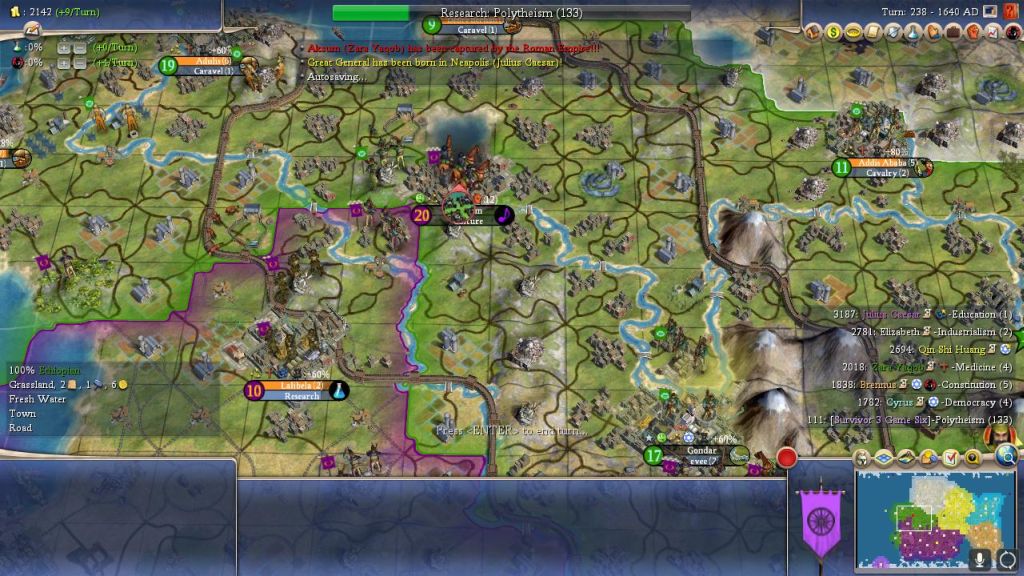
Any notion of Zara winning this game was now hopelessly in ruins, much to the dismay of myself and the rest of the picking contest field. It seemed inevitable at this point that Caesar would keep stomping his way through the rest of the Ethiopian cities until they were all absorbed into the Roman Empire. Sure enough, there was little resistance over the following turns as the purple hordes of Caesar overran one city after another. At the same time, check out the techs being researched at the side of the screen in that image above. Caesar had backtracked to pick up Education, which he had skipped earlier and left him without the ability to construct any universities. He still didn't have Oxford University this late in the game. Meanwhile, Elizabeth was about to finish Industrialism tech, the one that unlocks tanks! All she had to do was research Combustion tech and then connect her oil resource. OK, surely there's no way that she could lose a war now, right?
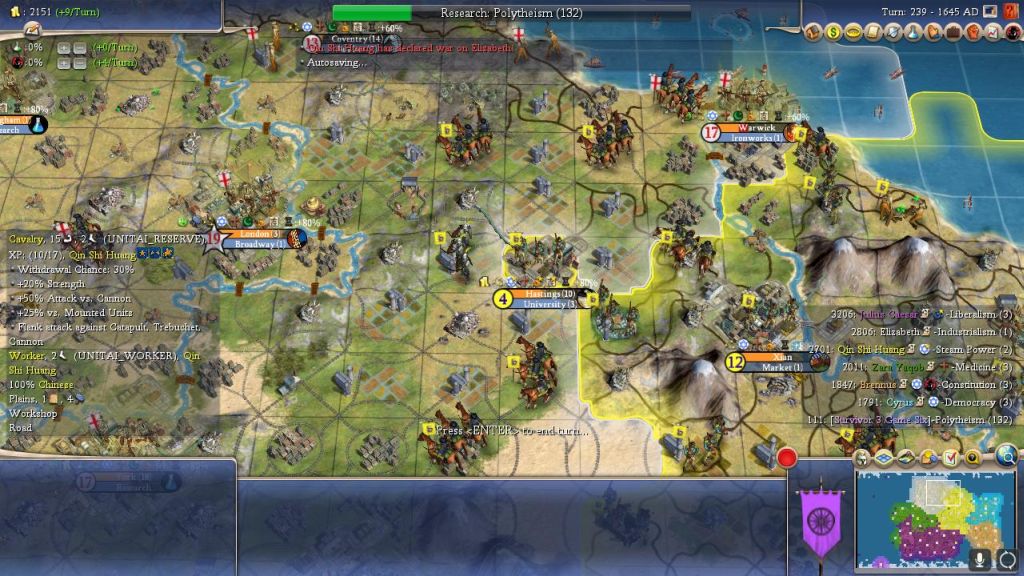
Qin was about to test that theory. He had a large number of rifles and cavs that poured across the border as part of this invasion, but Elizabeth had factories for a massive production edge along with infantry and machine guns and soon to be tanks. With that kind of production and tech edge, there was no way that the Chinese would be able to make any progress. And yet... and yet... Somehow the war turned into a stalemate. Qin couldn't break through the defenses and capture Warwick, yet Elizabeth somehow was unable to reclaim Hastings despite the presence of English culture surrounding the city on all sides. How was that even possible? It all came down to the city build queues that the Elizabeth AI was choosing. Even locked into a war, Elizabeth AI continued to tie up most of her key cities on wonders: Broadway, Hollywood, Cristo Redento, the United Nations, etc. This meant that her biggest and strongest cities weren't building units, and even though she was trading more effectively on a per-unit basis, she was only breaking even in the struggle with the numerically larger Chinese armies. It was one of the craziest things I've seen in all my years of Civ4, and this war remained deadlocked for the time being. Most of the fighting was actually taking place outside the gates of London, somehow, which the Chinese were repeatedly besieging.
Say it with me again: Elizabeth AI is too peaceful for her own good. 
While this deadly farce was taking place in the north, Caesar continued stomping through the remaining Ethiopian cities. They fell one after the other until Zara was completely eliminated on Turn 255:
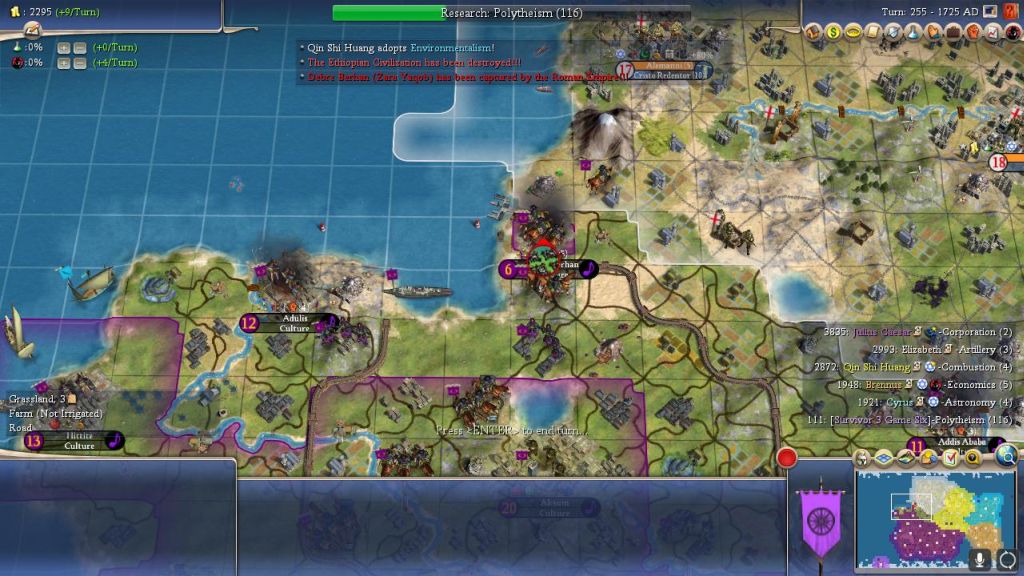
Zara had done a fine job of recovering from a slow opening, and he might have been able to win this game against a weaker field of competitors. Instead, he paid dearly for making a single crucial mistake when he decided to attack Cyrus off on the other side of the map. He was never able to recover from that calamitous error, and Caesar proceeded to carve him up across two highly successful wars. With most of Greece and all of Ethiopia under his control, Caesar now became the Runaway AI, with the most territory and the highest score by far. However, unlike in most AI Survivor games, the score leader was not the tech leader, and Elizabeth remained the most likely candidate to reach the end of the tech tree and launch the spaceship.
Or maybe she wouldn't need to fool with the spaceship at all. Two turns after Zara was eliminated, this message popped up:
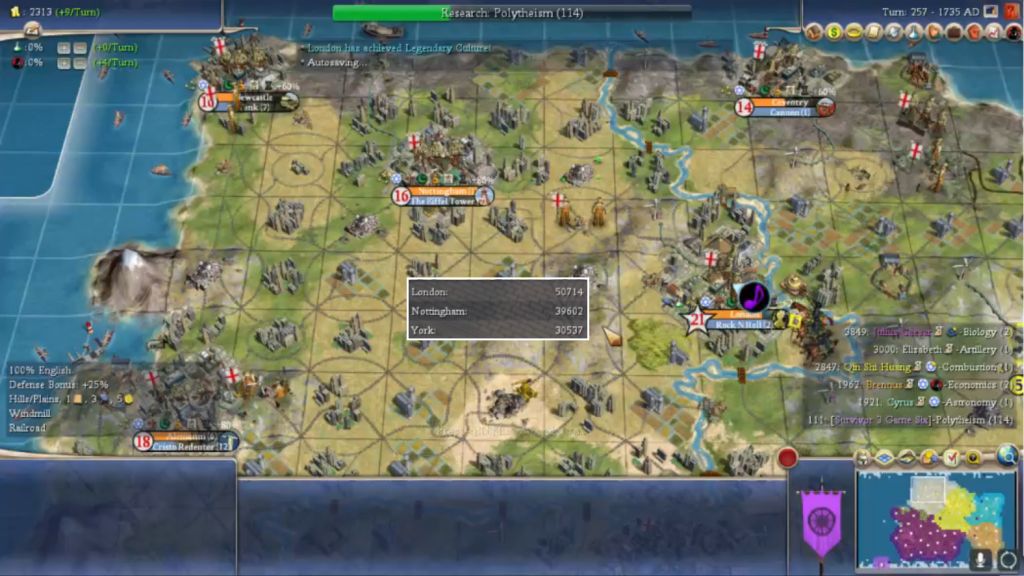
London has achieved Legendary Culture - wow! This was not on our radar screen at all. Elizabeth had not been running the Culture slider at any point in time, and the announcement that one of her cities had gone Legendary took us all by surprise on the Livestream. I had to go back and take this image retroactively from the stream footage since I wasn't expecting it. Furthermore, Lizzie didn't just have one Legendary city, she was closing in on having the three of them required for the Cutural victory condition. Nottingham was sitting at 39k culture, and York (just offscreen to the south of London) was a little over 30k culture. With Nottingham about to finish the Eiffel Tower for free broadcast towers in all cities, their cultural output would only continue to increase. A quick calculation revealed that York was making about 300 culture/turn, and at the current rate would take about 60-70 turns to go Legendary. Still, that would decrease as Elizabeth continued to build more cultural stuff, and if she were ever to turn on the cultural slider, this game might be over in a real hurry. Apparently having five domestic religions and running Free Religion (via Shwedagon Paya) for ages on end produced an awful lot of culture for the English. Caesar's victory wasn't so guaranteed after all.
Roughly ten turns later, Elizabeth seemed to realize how close she was on the cultural front and suddenly turned on the slider, setting it all the way to 100% culture. York's culture zoomed up to 800 per turn, and Hollywood was about to finish inside for another major boost to cultural production. All of sudden, our countdown to Elizabeth's victory had less than two dozen turns remaining. She was about to win the game! Then the war horns blared:
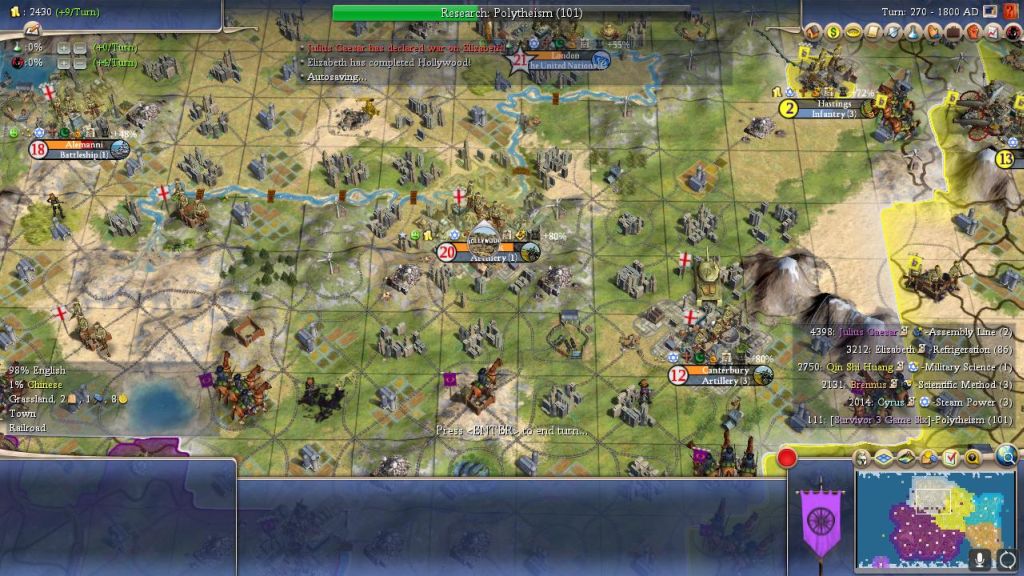
Whoa!  Caesar declared war and his cavs swarmed over the border into English territory. After going through so many past games where an AI leader was able to blast off into space or win via culture with no response from the other AI leaders, this was finally the opposite scenario. We were about to see the victor of Game Six decided right here between Elizabeth and Caesar. With the Hollywood wonder added to the city of York, it was now up to 1000 culture/turn (!) With about 35k culture inside the city when Caesar invaded, the countdown to Elizabeth's victory stood at roughly 15 turns. She would win sometime around Turn 285. Caesar had to capture one of the three Legendary cities in that span of time or the game was going to end in an English Cultural victory.
Caesar declared war and his cavs swarmed over the border into English territory. After going through so many past games where an AI leader was able to blast off into space or win via culture with no response from the other AI leaders, this was finally the opposite scenario. We were about to see the victor of Game Six decided right here between Elizabeth and Caesar. With the Hollywood wonder added to the city of York, it was now up to 1000 culture/turn (!) With about 35k culture inside the city when Caesar invaded, the countdown to Elizabeth's victory stood at roughly 15 turns. She would win sometime around Turn 285. Caesar had to capture one of the three Legendary cities in that span of time or the game was going to end in an English Cultural victory.
Geographically, the three Legendary cities were located in the middle of Elizabeth's territory. York appeared to be the most exposed location since it was situated south of London. Nottingham was even further away, located to the northwest of the English capital. I did not think that Caesar was going to be able to pull this off, given that the AI pathfinding was just as likely to waste time attacking non-Legendary cities that lacked strategic importance as it was to go after the three critical locations. And there was just so little time remaining! Nottingham went Legendary on Turn 273. York was the only city Lizzie still needed, and it was over 40k culture and climbing fast. Caesar was also attacking into a tech disadvantage, with essentially rifles and cavs against English infantry and machine guns and tanks. Caesar did have artillery available though instead of cannons, and that would help. Was he going to pull this off, or would the English hold the line and escape with a cultural win?
These were some of the most exciting turns we've ever had in Civ4 AI Survivor. I'd encourage everyone to go check out this part of the Livestream; I'll try to create a shorter video of the crucial turns and put it on YouTube for easier viewing. Caesar chose to attack up the west coast, heading first for the former barb city of Alemanni. It fell on Turn 274, but of course that did not do anything to stop the Cultural victory and time was rapidly running out. Even worse for Caesar, Qin now chose to sign peace with Elizabeth and remove the Chinese armies from the battlefield. The Roman armies paused for a few turns to heal, and then headed for... Nottingham as their next target. That was one of the three Legendary cities, and Caesar could have gone for nearby city of Newcastle just as easily, which would have sealed the game for Elizabeth. Instead, he had just a few turns remaining to break the defenses of a Legendary city, which had the maximum possible +100% cultural defenses. It's incredibly rare to see a city with the full 100% defensive bonus - not from castle walls, purely from city culture - and I wondered if Caesar would be able to pull this off. He did have several artillery units with him, and that may have swung the outcome of this entire game. Because Caesar did manage to remove the defenses of Nottingham and send in his three dozen cavs, which were enough to capture the city:
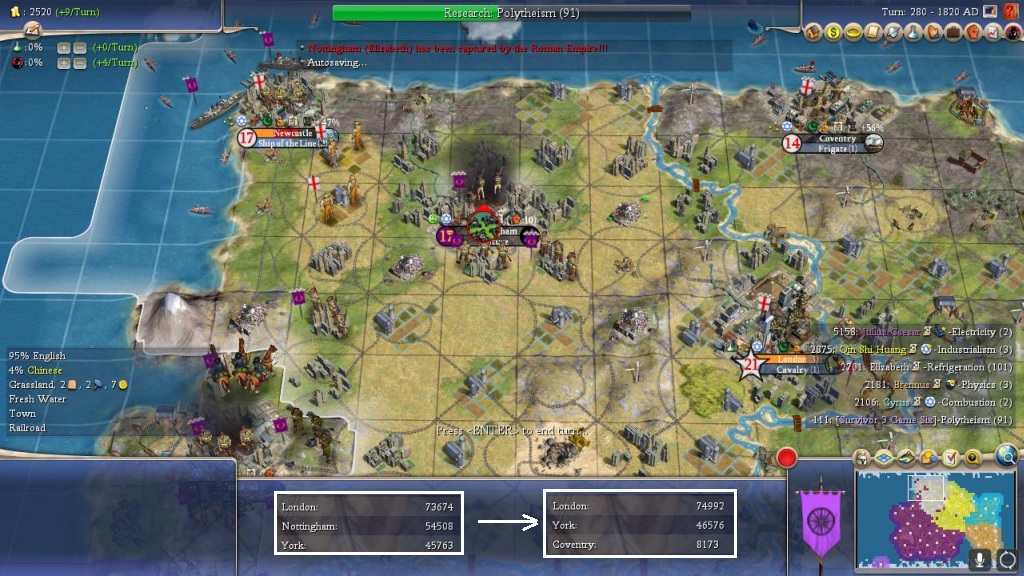
And that did it.  Elizabeth only had three potential Legendary cities; her fourth best city was Coventry with a mere 8000 culture, which was nowhere near close enough. Perhaps Hastings would have been a candidate if she hadn't lost it to Qin earlier, but that had removed one of the other core English cities from contention. Lizzie was now finished, and this was a particularly cruel ending to the game for her. York went over the 50k mark and became a Legendary city on Turn 285, which would have given her the victory if she had managed to hold onto Nottingham. She missed the victory by a mere five turns. And this wasn't just a matter of falling into second place instead of first place. Lizzie had missed taking a victory by the narrowest of margins, and the failure to do was going to eliminate her from the competition entirely, as Caesar wasn't about to stop attacking any time soon. Despite the continuing English edge in technology, Elizabeth had about 5 cities left at this point compared to about 25 cities for Caesar. It was all over now except for the screaming. Although Caesar would take several dozen more turns to complete the conquest of England, the final outcome was assured at this point. What a cataclysmic outcome this had been for Elizabeth.
Elizabeth only had three potential Legendary cities; her fourth best city was Coventry with a mere 8000 culture, which was nowhere near close enough. Perhaps Hastings would have been a candidate if she hadn't lost it to Qin earlier, but that had removed one of the other core English cities from contention. Lizzie was now finished, and this was a particularly cruel ending to the game for her. York went over the 50k mark and became a Legendary city on Turn 285, which would have given her the victory if she had managed to hold onto Nottingham. She missed the victory by a mere five turns. And this wasn't just a matter of falling into second place instead of first place. Lizzie had missed taking a victory by the narrowest of margins, and the failure to do was going to eliminate her from the competition entirely, as Caesar wasn't about to stop attacking any time soon. Despite the continuing English edge in technology, Elizabeth had about 5 cities left at this point compared to about 25 cities for Caesar. It was all over now except for the screaming. Although Caesar would take several dozen more turns to complete the conquest of England, the final outcome was assured at this point. What a cataclysmic outcome this had been for Elizabeth.
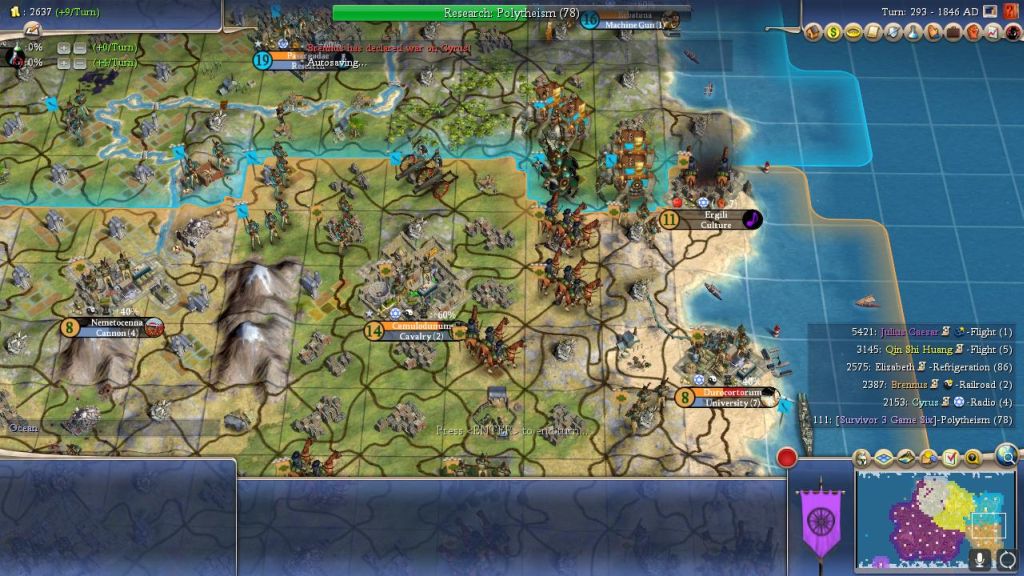
That wasn't quite the end of the game, however. Brennus was stirring up trouble in the east, as he declared war on Cyrus and, more importantly, brought Qin into the war as well. The Persians likely could have held off the Celtic assault but stood no chance against the much more advanced Chinese. Qin also had access to tanks by now, and they overran most of the Persian cities over the next two dozen turns. Cyrus had to be bitterly cursing Brennus, the leader who had repeatedly ruined his game after a promising opening. Time and again Brennus had dragged down Cyrus' attempts to establish himself over in the east, and this final invasion was a nasty punch in the gut. As for Qin, he had seemed certain to get eliminated at some point after executing such a weak early landgrab, and yet somehow the Chinese leader now found himself in a lock for second place. Qin had picked up some crucial territory from the death of Pericles, and then served as a thorn in the side of Elizabeth for the rest of the game, although to be fair Elizabeth had started the first two of those wars herself. We could hardly hold Qin responsible for having an anti-English grudge after he'd been invaded twice by his western neighbor. Now Qin was picking up most of the Persian spoils for himself and locking down a position in the playoffs.
It was a close race to see who would be eliminated first. Cyrus "won" this race by suffering elimination on Turn 308, and Elizabeth followed five turns later:
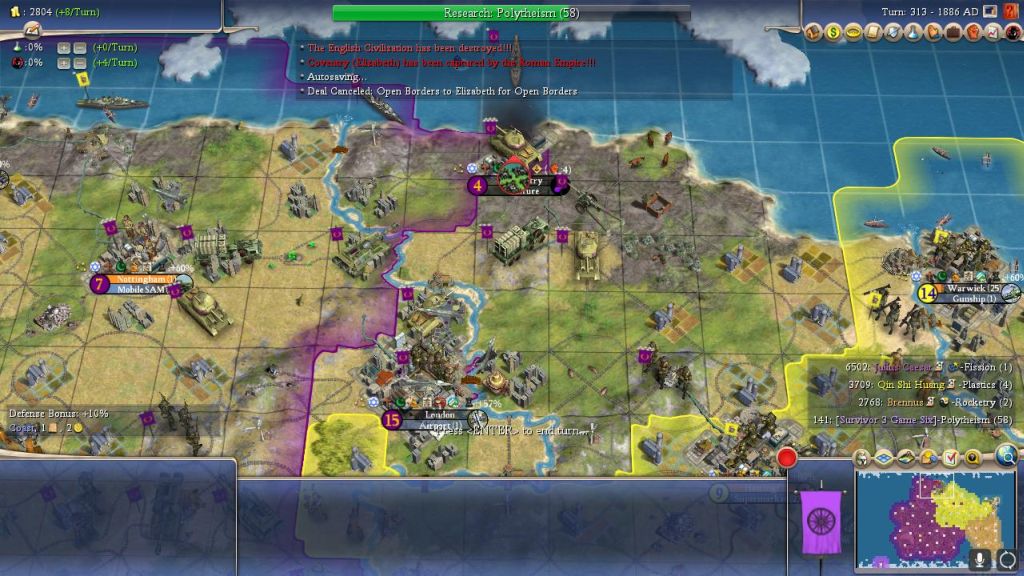
What an up-and-down game for the English. Elizabeth was the score leader for most of the game and the tech leader for the entirety of it. I think this is the closest any leader has ever been to winning a game only to fall short and wind up getting eliminated instead. I genuinely believe that she would have held out long enough to win if Caesar had been attacking with cannons instead of artillery pieces, it was that close during the decisive turns. This match was the perfect encapsulation of Elizabeth's strengths and weaknesses as an AI leader in Civ4. She is amazing at developing a research lead, and her internal infrastructure and development are right up there with Gandhi and Mansa Musa as the best in the game. However, she is almost laughably bad at fighting military campaigns, and repeatedly managed to lose territory to other leaders that were far behind in technology. Most of these problems would be solved if she would simply BUILD MORE MILITARY, which seems to be the critical thing that separates her from some of the other top AI leaders. Still, given just slightly better luck, she would have walked away from this game the winner and we would be preparing to watch her again in the playoffs. This game had truly come down to the wire.
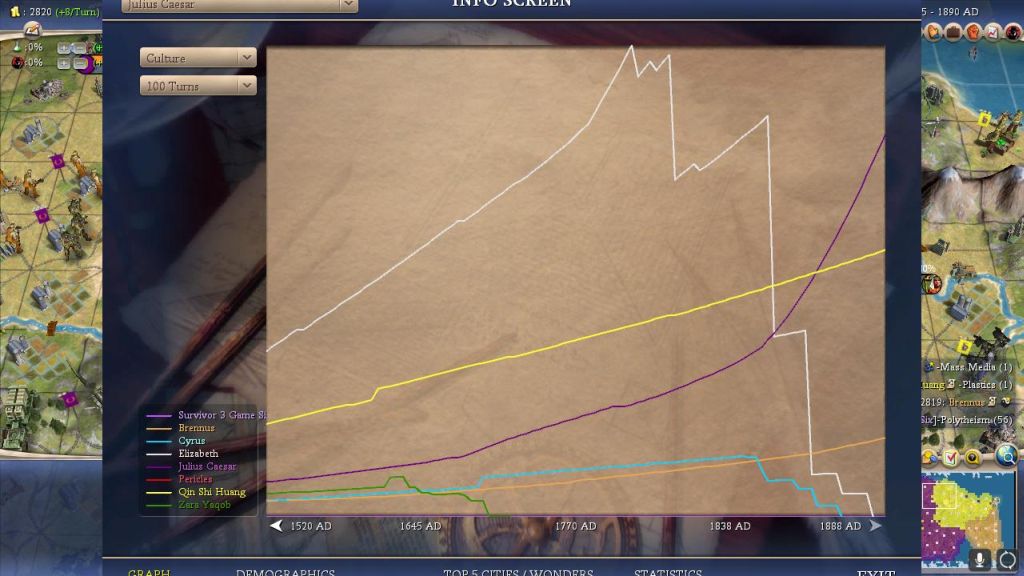
Oh, and if you've ever wondered what it looks like to have three Legendary cities get captured on the cultural bar graph? That's what it looks like. Poor Elizabeth. 
We still had a ways to go at this point, since neither Caesar nor Qin were particularly close to launching their own spaceships. Caesar was sitting at about 55% land area and that meant he needed to attack someone else if he were to get over the Domination limit and win that way. I was expecting him to attack Brennus, since Caesar had been consistently aggressive throughout this game and he was still "Annoyed" with the Celtic leader. For that matter, Caesar will declare war at "Pleased" relations and that meant Qin was fair game as well. We were keeping an eye on a terrifying stack that Caesar had in a city near the Chinese border, which contained 18 anti-tanks, 39 SAM infantry, 40 marines, 37 paratroopers, 30 cavs, 45 tanks, 30 gunships, and 30 mobile artillery. And that was only the units in that one stack, not counting all of the other Roman units randomly wandering around inside their borders. Much to my surprise though, Caesar never ended up attacking either of the other two leaders. Qin was "Pleased" with both and wouldn't declare war on either, while Brennus knew enough not to go stirring up any more trouble. No one liked each other enough to vote for anyone else in the United Nations, and these leaders were all very far away from having any Legendary cities. So it was space after for this game:
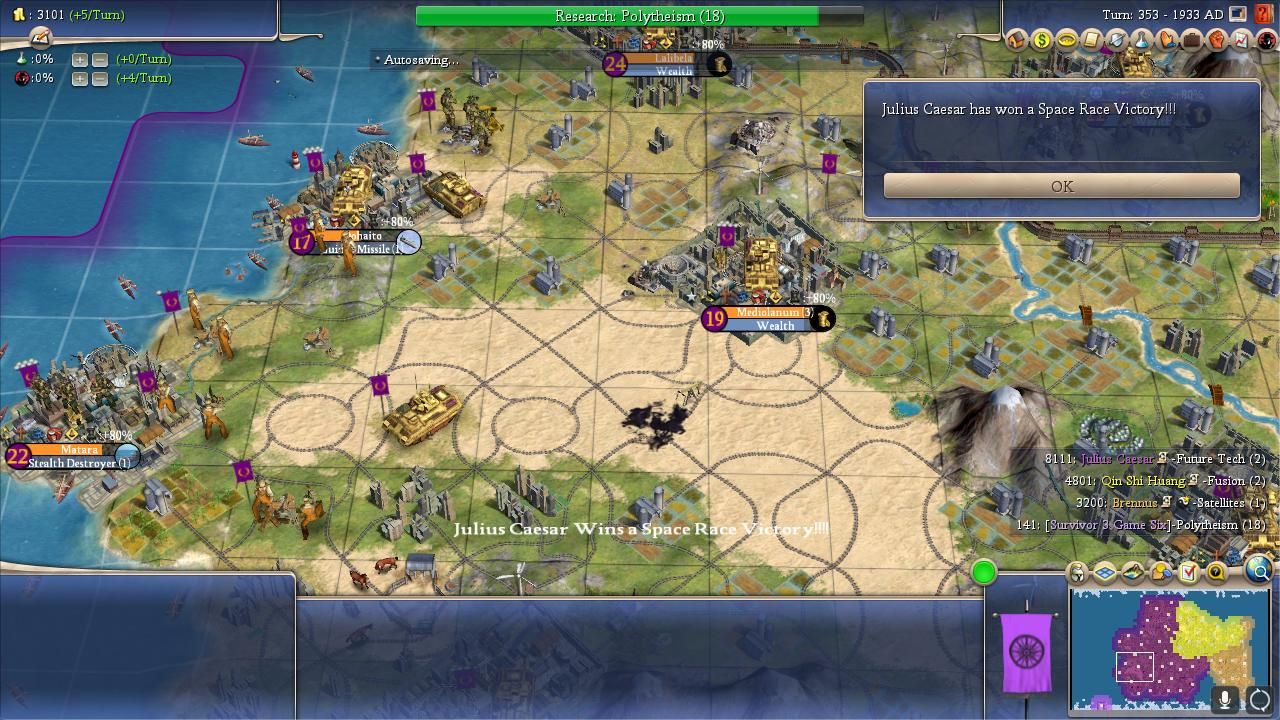
With Caesar launching on Turn 343 and winning a late victory on Turn 353 when the spaceship arrived in Alpha Centauri. Qin was down to the last few techs by this point, although he never had a chance to surpass Caesar in the space race. Brennus wasn't even close and was quite lucky to still be breathing given how much everyone hated him in this game. Thus we ended up with Caesar and Qin going to the playoffs with Brennus sent off to the Wildcard game for another shot. As it turned out, all four of our leaders who had previously reached the Championship game - Zara and Elizabeth in Season One, Cyrus and Pericles in Season Two - were sent packing. So much for past history! That said, Elizabeth and Zara and even Cyrus had all played legitimately strong games here. I think any of them could have won with slightly better luck breaking their way. Only Pericles had played a truly poor game, and he had deservedly been the First to Die. This was a really tough field for an opening round game.
That lategame showdown between Caesar and Elizabeth though, wow, what a spectacle that had been. It was as exciting as anything we've ever seen before in these games. For those of us who were lucky enough to watch it live, we were truly fortunate. It'll probably be a while before we get an ending this good again. I hope everyone enjoyed this one.



